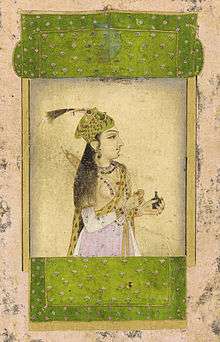Begum
Bagum,Begum, begom, begam, baigum or beygum is a royal and aristocratic title from Central and South Asia.[1] It is the feminine equivalent of the title baig or bey, which in Turkic languages means "higher official". It usually refers to the wife or daughter of a beg. The related form begzada (daughter of a beg) also occurs.[2]

In South Asia, particularly in Delhi, Hyderabad, Sindh, Punjab, Afghanistan, Khyber Pakhtunkhwa and Bengal, begum has been adapted for use as an honorific for Muslim women of high social status, accomplishment, or rank. The honorific may either precede or follow proper name of the woman.
Title
In modern society
Colloquially, the term is also used in Uzbekistan, India, Pakistan and Bangladesh by Muslim men to refer to their own wives, daughters, sisters or as an honorific address to a married or widowed woman.
In Bangladesh the term has been used for the titles of current and former First Lady of Bangladesh e.g. Begum Khaleda Zia and Begum Rowshan Ershad. It has also been used to refer to women of high social status such as phillantrophists, activists, authors and many others such as Begum Rokeya and Begum Sufia Kamal. Khaleda Zia and Sheikh Hasina, who have alternated as Prime Minister of Bangladesh since 1991, are nicknamed "the battling begums".[3]
The term became well known in the West, especially in the French-speaking world, due to Jules Verne's 1879 novel The Begum's Millions.
The term had earlier become known in Great Britain during the impeachment and Parliamentary trial of Warren Hastings, former Governor-General of India, which lasted from 1787 until 1795. One of the major charges against Hastings was that he had unjustly confiscated land belonging to the "Begums of Oudh" (the mother and grandmother of Asaf-Ud-Dowlah, Nawab of Oudh).
Begumpet is one of the major commercial and residential suburbs of the city of Hyderabad, India. Begumpet stands on land given by the sixth Nizam of Hyderabad to his daughter as her wedding present when she married a Paigah noble.
Mississauga, Ontario, Canada, a suburb of Toronto, is referred as Begumpura ("Ladies' Town") by members of the Pakistani community of Toronto. Mississauga has a large Pakistani immigrant community and many husbands work in the Persian Gulf and Saudi Arabia while their wives and children live in Mississauga.[4]
Among the Nizari Ismaili people, the title is also used as the official style of the consort of their imam, the Aga Khan.
See also
References
- Hemenway, Stephen Ignatius (1975). The Novel of India: The Anglo-Indian novel. Writers Workshop. p. 107.
Begum (Hindi), Moslem princess or lady of high rank.
- Moazzambaig, Begzadi or Begzada. Digg.com: Social News. Retrieved July 8, 2011.
- Rowlatt, Justin (2 November 2008). "Bangladesh grows tired of the Battling Begums". BBC. Retrieved 24 September 2019.
- Muslim immigrants to Canada facing discrimination and social problems